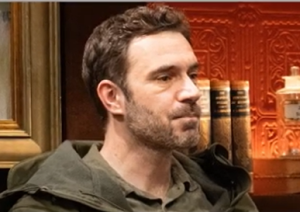Emmerdale has plunged viewers into a fresh vortex of dread and speculation after a brutal woodland confrontation that seemed to end McKenzie “Mack” Boyd’s life — but fans are convinced the story is far from over. Recent episodes showed Mack, played by Lawrence Rob, confronting John Sugden (Oliver Farnworth) over Nate Robinson’s mysterious death; what followed was chilling: Jon chased Mack through the trees, fired a bow and arrow, and then delivered a savage blow by hurling a rock at Mack’s skull. The episode closed with Jon watching the forest flames gutter out, implying he’d burned Mack’s body and any trace of his crime. Yet astute viewers noticed a crucial absence — no lifeless body, no close-up confirming Mack’s death — and from that absence sprang a torrent of theories that John’s actions are part of something far more monstrous than a single, impulsive slaying.
The core of the fans’ theory rests on what the camera didn’t show. On Reddit, an influential thread disassembled the scene frame by frame and argued Jon’s strike might have shattered Mack’s legs rather than cracking his skull. If true, this would transform the narrative from murder to abduction and prolonged torment: Mack alive but helpless, transported to a secluded location, treated just enough to survive and kept in a state of dependency. Supporters of the theory point out Jon’s disturbing savior complex — a character trait suggesting he believes he alone can “fix” people he perceives as broken. In their view, Jon’s alleged plan is more than disposal; it’s an attempt to craft Mack into a possession, someone to control, tend, and punish for imagined transgressions, a twisted echo of classic soap psychodrama that keeps the audience on edge.
Other fans expanded the speculation into darker logistics. Several proposed that Jon may have buried Mack alive in a shallow coffin or is holding him sedated and chained in a remote outbuilding near the holiday cottage. Theories range from Mack being kept in a coma induced by drugs to being deliberately maimed to prevent escape, with Jon carefully checking an air tube above ground or sneaking food and water to maintain the illusion of survival without exposure. The reasoning often circles back to plausibility within the show’s world: why would Jon transport a corpse to the cottage unless he planned on returning with it? Why would he risk moving a dead body if he feared discovery? To many viewers, those questions only strengthen the case for Mack being alive — and for Jon having engineered a long, cruel plan to keep him hidden.
Adding fuel to the speculation is the show’s decision to tease events through flashbacks. Actor Lawrence Rob revealed that a sequence filmed last October — showing Mack running — will finally be aired, and that fragment had previously teased viewers without explanation. That withheld context has created a narrative gap fans are eager to fill. Was Mack fleeing danger or chasing someone else? The delayed reveal encourages the idea that the truth is layered: past events will retroactively recast Jon’s actions, making his motivations clearer and perhaps darker. The production detail — the beanie Lawrence had to wear to hide continuity changes — underlines how carefully the series builds these moments. Fans now expect the flashback to slot into the current timeline as a crucial piece of the puzzle, potentially exposing why Jon snapped and what he had premeditated before the forest encounter.
The emotional stakes of any resolution are enormous. If Mack is indeed alive, he faces a nightmare of dependency, pain, and humiliation; if he is dead, the moral and legal fallout for Jon will be seismic, reorienting every relationship in the village. Either outcome promises intense scenes: tearful confrontations with Laurel and other loved ones, police investigations that unearth hidden connections, and the slow-burning psychological unraveling of a character who crossed a line he cannot uncross. Emmerdale’s writers appear to be playing a long game, using ambiguity and fan deduction to keep audiences invested. As viewers piece together clues and rewatch pivotal moments, social media has become a communal detective board where every glance, misdirected camera angle, and offhand remark is dissected for hidden meaning. 
In the end, the show’s restraint — showing consequences without clear confirmation — has produced a modern example of soap opera suspense at its finest. Theories that Jon is holding Mack captive, or that the body was never found because it never existed, capture both the imagination and the horror of Emmerdale’s storytelling. Whether the writers punish Jon with exposure, twist the knife further by revealing a more intimate betrayal, or shock viewers with Mack’s eventual return in far worse shape, one thing is certain: the coming episodes will be watched with bated breath. Fans will be replaying scenes, comparing flashbacks, and waiting for the moment when the truth comes into brutal, heartbreaking focus.





